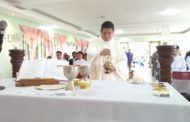
“. . . the priesthood unites all of the callings to which man may respond and cannot be thought of as just one of them. “
INTRODUCTION
Since it is the divine grace that elevates a man, through the laying-on-of hands, to be a priest, it is clear that the priesthood is unlike any other vocation open to men. Even to use the term “vocation” can be misleading, since there are other vocations and since the priesthood is not on the same level as those other vocations. In a very important sense, the priesthood unites all of the callings to which man may respond and cannot be thought of as just one of them.
According to the rite of ordination, the priest is specifically ordained to “stand in innocence before God’s holy altar, to proclaim the Gospel of His truth, to offer unto Him spiritual gifts and sacrifices, and to renew His people through the laver of regeneration.” The ordaining hierarch prays that “he may be wholly God’s servant, in all things acceptable unto Him.” In the Liturgy during which he is ordained, he is given the portion XC of the Holy Bread to hold until the elevation. On giving it, the bishop says to him: “Receive thou this pledge, and preserve it whole and unharmed until thy last breath, because thou shalt be held to an accounting therefor in the second and terrible coming of our great Lord, God, and Savior Jesus Christ.” This act and these words are an indication that it is when the priest presides at the celebration of the Holy Eucharist, the fullness of his priesthood and his responsibility are both realized and made evident.
A CALLING
The priesthood is a calling or a life, not simply one occupation among many that a man might choose. This means that the priest has been called by God and given the gift of God, that is, the grace to accomplish his work. “That thou stir up the gift of God which is in thee by the putting on of my hands . . . [God] hath saved us, and called us with a holy calling, not according to our works, but according to His own purpose and grace” (II Timothy 1:6,9). The calling is holy, high (Philippians 3:14), heavenly (Hebrews 3:1), and therefore, the response to this calling and the acceptance of it and the ways of carrying it out are different from the choice and fulfillment of any other occupation. The priest must give account for all those committed to his charge. Of course, all Christians shall give account of themselves to God and they must be especially careful not to put a stumbling block or an occasion to fall in their brother’s way (Romans 14:12-13). If this is said of all of Christ’s followers, how much more does it apply to the priest, whose responsibility is to lead men to their salvation? When the people are exhorted to obey them that have the rule and submit themselves, it is because those rulers “watch for their souls, as they that must give account” (Hebrews 13:17).
THE SACRAMENTAL PRIESTHOOD
The whole body of the faithful, the people of God, is a holy and royal priesthood, constituted “to offer spiritual sacrifices, showing forth the praises of Him who hath called them out of darkness into His marvelous light” (I Peter 2:5,9). And within this priesthood of all believers, there is a special, sacramental priesthood, the bishops and priests, with their helpers, the deacons. That this has been so from the beginning, we have the testimony of Saint Paul: “Now there are diversities of gifts, but the same Spirit. And there are differences of administration, but the same Lord. And there are diversities of operations, but it is the same God which worketh all in all…. For by one Spirit are we all baptized into one body…. That there should be no schism in the body; but that the members should have the same care one for another…. Now ye are the body of Christ and members in particular. And God hath set some in the Church, first apostles, secondarily prophets, thirdly teachers, after that miracles, then gifts of healings, helps, governments, diversities of tongues. Are all apostles? Are all prophets? Are all teachers? . . .” (I Corinthians 12:4-29). And later he reminds Titus of the reason for having left him in Crete: “For this cause left I thee in Crete, that thou shouldest set in order the things that are wanting, and ordain elders [presbyters] in every city, as I had appointed thee” (Titus I:5).
The priest is the member of the body that has the charge and the responsibility to unite all together and sacramentally to manifest the presence of Christ in the Church. He does not do this through his own special talents, knowledge, or abilities, although there are specific qualifications for the office he holds (II Timothy 3:1-7 and Titus 1:6-16). “His priestly character testifies to the fact that all human being and life must be offered to God” (Father Thomas Hopko, On the Male Character of the Christian Priesthood, St. Vladimir’s Seminary Quarterly, Vol. 19, No. 3).
RESPONSIBILITIES
In practice the priest’s own life is wholly dedicated to the service of God and God’s people, all day, every day. Every part of his personal life reflects his calling and his responsibility. Even if, because of certain circumstances, he must have secular employment to sustain his life and his family’s, his priesthood remains his only vocation and can never be a “part-time job.”
In carrying out his duties, the priest must, first of all, preach the word, in accordance with one of the qualifications enumerated by Saint Paul, “apt to teach,” and in obedience to the same Apostle’s instruction to Saint Timothy, “Preach the word; be instant in season, [and] out of season; reprove, rebuke, exhort with all long-suffering and doctrine” (II Timothy 4:2). He must never miss the opportunity to teach the saving truths revealed by our Lord Jesus Christ, not only in sermons in the church and in classes, but also when he visits his people, and when he encounters people willing to listen no matter where he finds them.
He must live a life consistent with what he teaches. It is inconceivable for the priest to teach and exhort to holiness and himself to live a life dedicated to pleasures and entertainments, greed and personal ambition. “Great may be the teacher’s boldness, when he can instruct his disciples from his own good deeds” (Saint John Chrysostom, Homily V, on II Thessalonians). As the Lord himself says: “Physician, heal thyself” (Luke 4:23). Saint Paul says: “Thou that teachest another, teachest thou not thyself? Thou that preachest that a man should not steal, dost thou steal? Thou that sayest a man should not commit adultery, dost thou commit adultery? Thou that abhorest idols, dost thou commit sacrilege? Thou that makest thy boast of the law, through breaking the law dishonorest thou God?” (Romans 2:21-23).
MINISTERING THE SACRAMENTS
Priests are, in Saint Paul’s words, “ministers of Christ and stewards of the mysteries of God” (I Corinthians 4:1). The awesome responsibility for administering the mysteries (or sacraments) of God cannot be over emphasized. It is appropriate here to recall the words of the prayer at the beginning of the Rite of Holy Baptism: “And sanctify me wholly by thine all-perfect, invisible might, and by thy spiritual right hand; lest, while I proclaim liberty unto others, and administer this rite with perfect faith in thine unutterable love towards mankind, I myself may become the base slave of sin.” He must understand and teach the meaning of the mysteries to those who are to receive them. He must not administer any sacrament to unbelievers or heretics. He must faithfully administer the mysteries, having first cleansed himself by repentance. He must not alter, because of laziness or haste, the form prescribed for the administration of the mysteries. He must not charge or name a price for any sacramental ministration. Finally, if “he that eateth and drinketh unworthily, eateth and drinketh damnation to himself” (I Corinthians 11:29), what could be said of those who administer the same unworthily?
Following the example of the Apostles, the priest must give himself “continually to prayer, and to the ministry of the word” (Acts 6:4). Saint Paul exhorts his disciple, Timothy, “that first of all, supplications, prayers, intercessions, and giving of thanks be made for all men” (I Timothy 2:1). And the Thessalonians: “Pray without ceasing” (I Thessalonians 5:17). Prayer must necessarily be the basis for the fulfilling of all the priest’s duties. The priest, then, is a man of prayer in the church’s services, in the home with the family, with other members of his flock, and privately. It is useless for a priest who neglects prayer himself to urge his people to pray, because his neglect will be evident to them.
CONCLUSION
It is with all the above in view, of the awesome responsibility of that man who responds in the fullest possible way to the call of Christ to follow Him, that we have felt it necessary to initiate an in-depth study of some the problems faced by the priest in our contemporary society. The first of these studies will have to do with “Marriage and the Priesthood.”
Post Credit: Holy-Trinity.org










